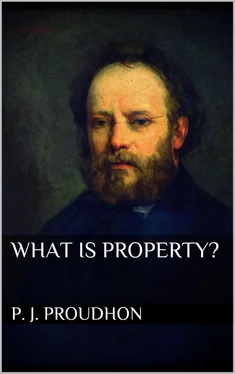It is the same with the right of security. Society promises its members no half-way protection, no sham defence; it binds itself to them as they bind themselves to it. It does not say to them, "I will shield you, provided it costs me nothing; I will protect you, if I run no risks thereby." It says, "I will defend you against everybody; I will save and avenge you, or perish myself."
The whole strength of the State is at the service of each citizen; the obligation which binds them together is absolute.
How different with property! Worshipped by all, it is acknowledged by none: laws, morals, customs, public and private conscience, all plot its death and ruin.
To meet the expenses of government, which has armies to support, tasks to perform, and officers to pay, taxes are needed. Let all contribute to these expenses: nothing more just. But why should the rich pay more than the poor? That is just, they say, because they possess more. I confess that such justice is beyond my comprehension.
Why are taxes paid? To protect all in the exercise of their natural rights—liberty, equality, security, and property; to maintain order in the State; to furnish the public with useful and pleasant conveniences.
Now, does it cost more to defend the rich man's life and liberty than the poor man's? Who, in time of invasion, famine, or plague, causes more trouble,—the large proprietor who escapes the evil without the assistance of the State, or the laborer who sits in his cottage unprotected from danger?
Is public order endangered more by the worthy citizen, or by the artisan and journeyman? Why, the police have more to fear from a few hundred laborers, out of work, than from two hundred thousand electors!
Does the man of large income appreciate more keenly than the poor man national festivities, clean streets, and beautiful monuments?
Why, he prefers his country-seat to all the popular pleasures; and when he wants to enjoy himself, he does not wait for the greased pole!
One of two things is true: either the proportional tax affords greater security to the larger tax-payers, or else it is a wrong.
Because, if property is a natural right, as the Declaration of '93 declares, all that belongs to me by virtue of this right is as sacred as my person; it is my blood, my life, myself: whoever touches it offends the apple of my eye. My income of one hundred thousand francs is as inviolable as the grisette's daily wage of seventy-five centimes; her attic is no more sacred than my suite of apartments. The tax is not levied in proportion to strength, size, or skill: no more should it be levied in proportion to property.
If, then, the State takes more from me, let it give me more in return, or cease to talk of equality of rights; for otherwise, society is established, not to defend property, but to destroy it. The State, through the proportional tax, becomes the chief of robbers; the State sets the example of systematic pillage: the State should be brought to the bar of justice at the head of those hideous brigands, that execrable mob which it now kills from motives of professional jealousy.
But, they say, the courts and the police force are established to restrain this mob; government is a company, not exactly for insurance, for it does not insure, but for vengeance and repression. The premium which this company exacts, the tax, is divided in proportion to property; that is, in proportion to the trouble which each piece of property occasions the avengers and repressers paid by the government.
This is any thing but the absolute and inalienable right of property. Under this system the poor and the rich distrust, and make war upon, each other. But what is the object of the war? Property. So that property is necessarily accompanied by war upon property. The liberty and security of the rich do not suffer from the liberty and security of the poor; far from that, they mutually strengthen and sustain each other. The rich man's right of property, on the contrary, has to be continually defended against the poor man's desire for property. What a contradiction! In England they have a poor-rate: they wish me to pay this tax. But what relation exists between my natural and inalienable right of property and the hunger from which ten million wretched people are suffering? When religion commands us to assist our fellows, it speaks in the name of charity, not in the name of law. The obligation of benevolence, imposed upon me by Christian morality, cannot be imposed upon me as a political tax for the benefit of any person or poor-house. I will give alms when I see fit to do so, when the sufferings of others excite in me that sympathy of which philosophers talk, and in which I do not believe: I will not be forced to bestow them. No one is obliged to do more than comply with this injunction: IN THE EXERCISE OF YOUR OWN RIGHTS DO NOT ENCROACH UPON THE RIGHTS OF ANOTHER; an injunction which is the exact definition of liberty. Now, my possessions are my own; no one has a claim upon them: I object to the placing of the third theological virtue in the order of the day.
Everybody, in France, demands the conversion of the five per cent. bonds; they demand thereby the complete sacrifice of one species of property. They have the right to do it, if public necessity requires it; but where is the just indemnity promised by the charter? Not only does none exist, but this indemnity is not even possible; for, if the indemnity were equal to the property sacrificed, the conversion would be useless.
The State occupies the same position to-day toward the bondholders that the city of Calais did, when besieged by Edward III, toward its notables. The English conqueror consented to spare its inhabitants, provided it would surrender to him its most distinguished citizens to do with as he pleased. Eustache and several others offered themselves; it was noble in them, and our ministers should recommend their example to the bondholders. But had the city the right to surrender them? Assuredly not. The right to security is absolute; the country can require no one to sacrifice himself. The soldier standing guard within the enemy's range is no exception to this rule. Wherever a citizen stands guard, the country stands guard with him: to-day it is the turn of the one, to-morrow of the other. When danger and devotion are common, flight is parricide. No one has the right to flee from danger; no one can serve as a scapegoat. The maxim of Caiaphas—IT IS RIGHT THAT A MAN SHOULD DIE FOR HIS NATION—is that of the populace and of tyrants; the two extremes of social degradation.
It is said that all perpetual annuities are essentially redeemable. This maxim of civil law, applied to the State, is good for those who wish to return to the natural equality of labor and wealth; but, from the point of view of the proprietor, and in the mouth of conversionists, it is the language of bankrupts. The State is not only a borrower, it is an insurer and guardian of property; granting the best of security, it assures the most inviolable possession. How, then, can it force open the hands of its creditors, who have confidence in it, and then talk to them of public order and security of property? The State, in such an operation, is not a debtor who discharges his debt; it is a stock-company which allures its stockholders into a trap, and there, contrary to its authentic promise, exacts from them twenty, thirty, or forty per cent. of the interest on their capital.
That is not all. The State is a university of citizens joined together under a common law by an act of society. This act secures all in the possession of their property; guarantees to one his field, to another his vineyard, to a third his rents, and to the bondholder, who might have bought real estate but who preferred to come to the assistance of the treasury, his bonds. The State cannot demand, without offering an equivalent, the sacrifice of an acre of the field or a corner of the vineyard; still less can it lower rents: why should it have the right to diminish the interest on bonds? This right could not justly exist, unless the bondholder could invest his funds elsewhere to equal advantage; but being confined to the State, where can he find a place to invest them, since the cause of conversion, that is, the power to borrow to better advantage, lies in the State? That is why a government, based on the principle of property, cannot redeem its annuities without the consent of their holders.
Читать дальше












